We discovered the book of the future
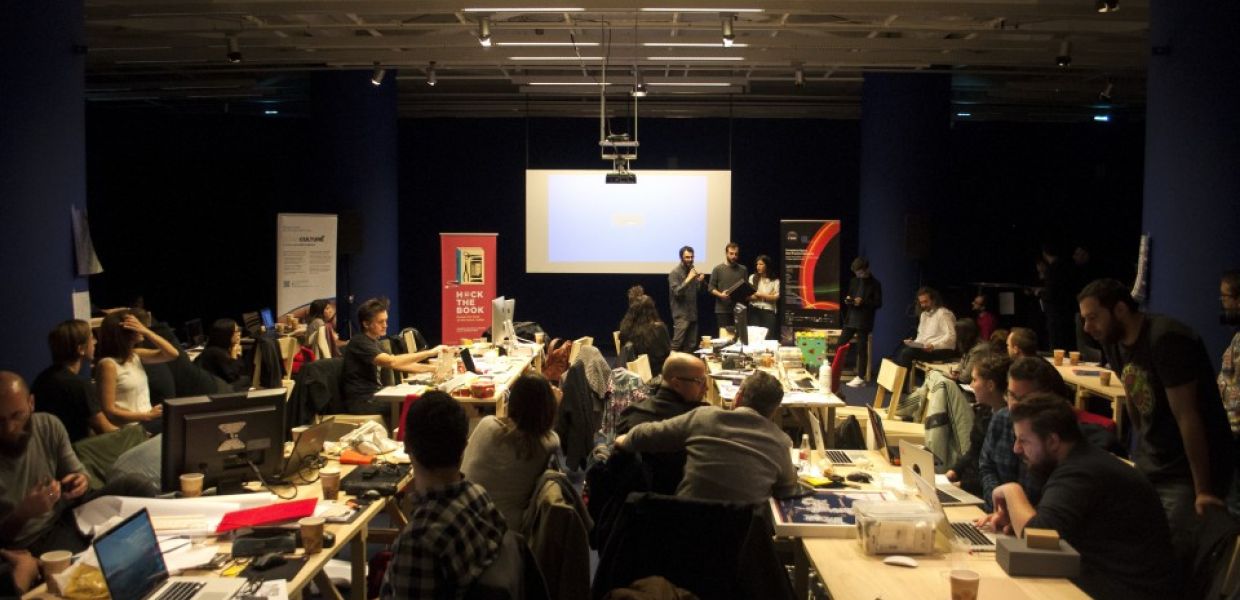
The first Book Hackathon in Greece was held on the 22nd, 23rd and 24th of January at the Onassis Cultural Centre. Ten teams, constituted by artists, designers, publishers, writers, poets, developers, innovative businessmen and hackers, were called to imagine the book of the future, in collaboration with the Europeana Space network and support of the non-profit organization Greek Free / Open Source Software Society (GFOSS).
Despite the predictions for its future, in a period of intangible networks of production and services, the traditional book remains a constant value for readers. What happens though when we add to the characteristics of a physical object new attributes provided by the digital connectivity? What if we move from the physical book to an object with enhanced capabilities? By applying smart technologies (Arduino, Raspberry Pi, Internet of Things [IoT]) during “HackTheBook”, the teams had to face the challenge of redefining the substance of the book within 48 hours and to suggest alternative models in the production value chain of the book.
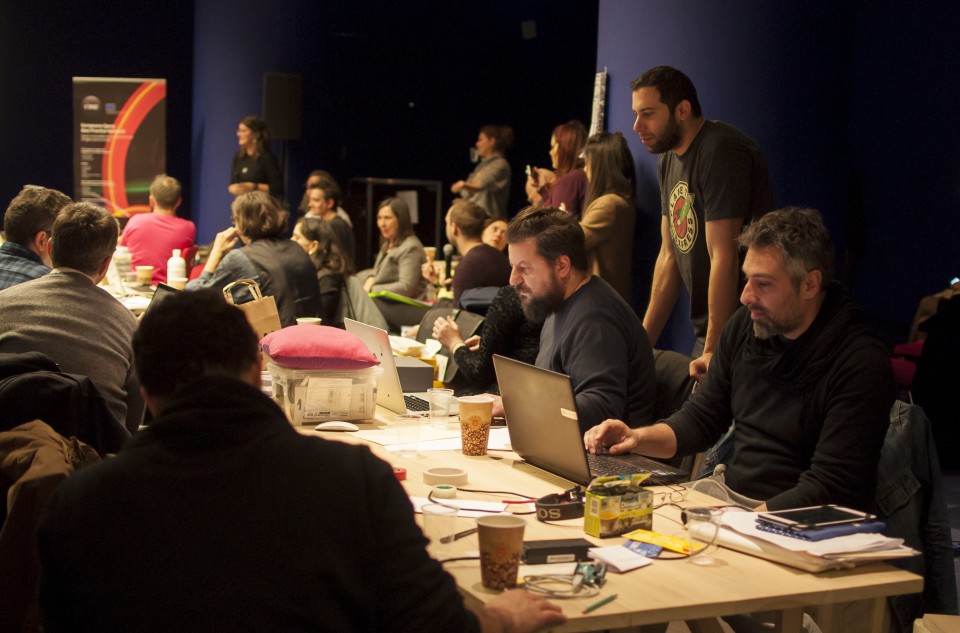
The teams that participated were: Digital Heritage Geeks, Arcbook, Experience Designers, Cook Lee, Vivl.io, MnemoTrace, Box The Book, Sink A Future, Calculus, Muzine. Each team had eight minutes to present the results of the work produced during the 48 hours they spent at the Onassis Cultural Centre. The participants could open, digital heritage content from Europeana Space, to experiment on it, and, in the end, to design a hybrid book. Apart from the technical challenges, the participants examined the legal restrictions that may have arisen, but also the financial sustainability of their proposal.
From the open invitation, 24 participants with experience in design, graphics, content curation, book art, creative programming and business modeling were called to work in teams on a business sustainable hybrid book. Next to these teams, prominent designers and theorists of open access and creative programming were offering their guidance. On Sunday, January 24th, the teams presented their suggestions in front of a judging committee.
The judging committee was constituted by Antonella Freza, a specialist in information and communication technologies and General Director of the Italian Promoter Srl, Saimon Kronsoou, Co-director and Co-founder of the Sessions REMIX, Gary Hall, Research Professor of Media and Performing Arts and Director of the Centre of Disruptive Media at the University of Coventry, Thanasis Deligiannis, political scientist, Coordinator of the Open Technology Group and member of GFOSS, Prodromos Tsiavos, legal adviser for the National Documentation Center/ National Hellenic Research Foundation and senior research fellow at the Media Institute at the University College London (UCL/BBC), Joanna Zylinska, Professor of New Media and Communication at the University of Goldsmiths in London and Theodoros Chiotis, Project Manager of the Cavafy Archive (Onassis Foundation), poet and literary theorist.

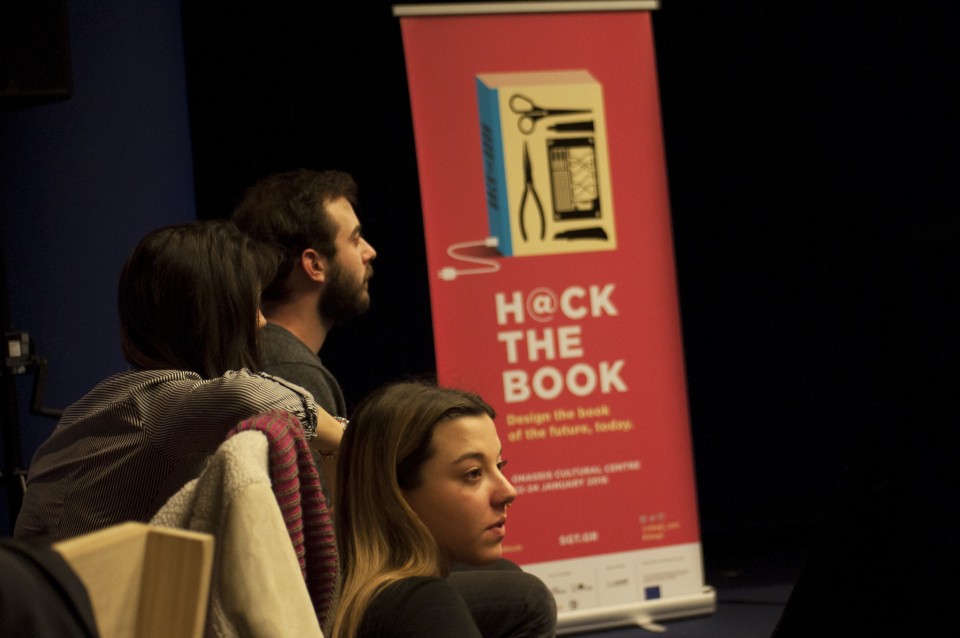
The teams presented their work with enthusiasm, answering to the questions of the judging committee and trying to prove the sustainability of their idea based on solid arguments. The three winning teams were: Sink A Future, Vivl.io, and Cook Lee. One representative from each team will travel to London to participate to the business workshops of REMIX, for an intensive Business Model Workshop which will be held by a specialist team of REMIX, a leading body of culture technology entrepreneurship. Among the three teams, the one with the strongest business plan will go through an intensive three-month process of incubation from REMIX and Europeana Space Network, with the aim to successfully capitalize the proposal.
Representatives of the three winning teams shared their Hackathon experience, talked about the projects they presented and their aspirations for London.
Sink A Future – Anna – Maria Vlasopoulou
“The team was built on shipwrecks and on the memory of their drowned uninsured staff. This was our first work and the opportunity from which the name of this team derived. Then came our participation to “HackTheBook”. We don’t have clear characteristics, rather each one of us has clear aesthetic and meaningful references. What we presented was a comment on the present form of internet as means of mass surveillance, the global geopolitical fluidity suggesting a new way of exchanging data. Our experience was good, we met very remarkable persons at the Cultural Centre. While being a bit hesitant at first, we came in contact with people with similar ideological and conceptual background and we interacted with most of the teams, something which we consider a gain for both sides. As for London, our distinction surprised us a lot as our project is more about criticizing particular financial/business systems and political events rather than suggesting sustainable solutions and product development prospects. Our plans are usually shaped by testing, we don’t have a particular aim for the future”.
The team Sink A Future is constituted by: Spiros Kokkonis, Anna-Maria Vlasopoulou and George Roussos.
Vivl.io – George Papanagiotou
“Thinking is a company which since 2010 deals exclusively with the technology of printed and digital book as well as with the creation of digital applications (websites, apps, microsites) for reading, marketing and dissemination of their content. Our participation in “HackTheBook” was thus obvious, as it was the first time that such a relative to our interests event took place in our country.
Our experience from hackathon was enjoyable. The initiative of the Onassis Cultural Centre and of Europeana Space was excellent and very useful for people and teams that wished to showcase their work, as the field of the book in our country has only slightly moved forward in comparison to the relevant technological innovations globally. The organisation was good and the place of the event was nice and functional. All the teams had very innovative suggestions and their competitive character gave us an additional motivation to reach a good result within 48 hours and with very particular requirements. The challenge to combine the specific analogue and digital technologies (printed, Arduino, eBook, Raspberry Pi, 3D printing) preserving at the same time the character and the experience of reading intact, was quite interesting.
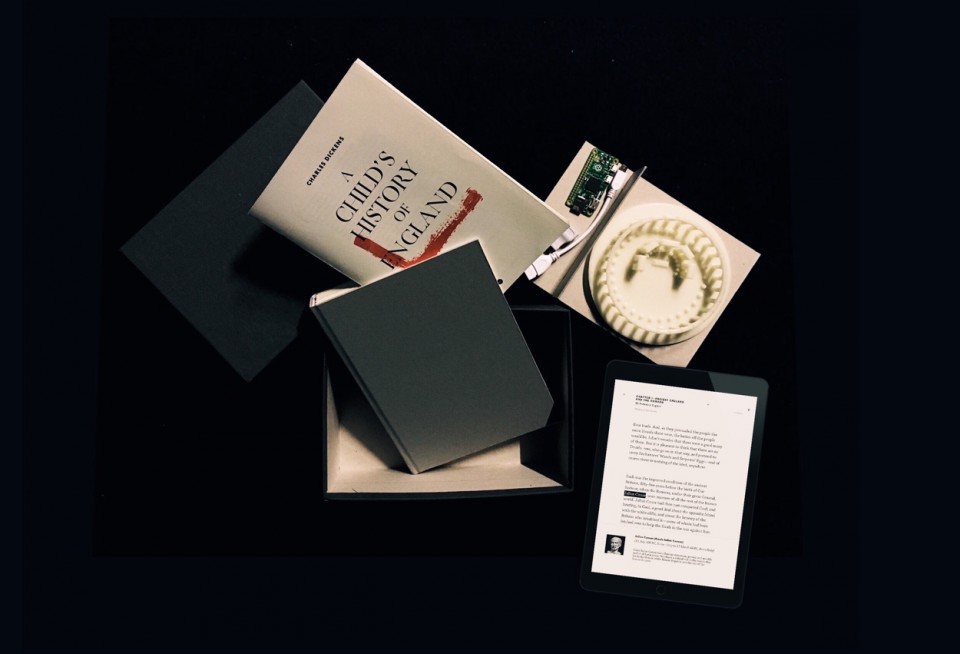
The work we presented was a development of the project vivl.io with which we have been occupied during this last year. The idea concerns the creation of an edition of classical texts of the world literary heritage which is provided in two basic versions: printed and digital, as well as a series of accompanying applications which are based in open software and hardware and they support the reading and storytelling experience. The book we chose for “HackTheBook” is the “A Child’s History of England” by Charles Dickens. The digital edition is not only provided in ePUB (the basic format of a digital book) but also through the browser - book-in-browser as this particular technology is called, which allows reading a book in any browser, as for example Chrome. Moreover, and here lies the main innovation of our proposal, we encode using open standards selected excerpts from the book which concern information such as locations, people, objects, dates, etc, information which we highlight afterwards, providing the reader with the context through applications that accompany, without disturbing, their digital reading.
The most interesting challenge of hackathon was when we were called to combine reading with interactive tools such as Arduino. We chose to create a map with locations mentioned in the book functioning as the old traditional recipe of the omniscient. When reading for a location, the reader has the possibility, through WiFi, to see the selected location in a physical map. We believe that this is a simple example of how someone can build hybrid activities in a classroom, as the potentials are huge - imagine timelines, maps, interactive games, all based in the narrative of the book. By activating the interest of young children in technology, you may equally motivate them in classical literature. For this reason, we included in our product a very cheap and simple computer, Raspberry Pi Zero, which has already installed the digital text, instructions (for children, parents and teachers) on how children can experiment with Arduino, instructions and advices on how they can print as 3D objects some of the objects mentioned in the book as well as the free edition of the Minercraft game, in which they can introduce 3D models that are based on the story of the book and to create their own experiences around it, by playing. As a team, we don’t have any doubt that the biggest creative force is children’s imagination, that is why we try to offer them tools and knowledge to develop it, avoiding to control the experience with predefined paths - we leave the child to create its own having as incentives the book and the story it narrates.
We are getting ready for London! We are lucky because following our participation at the London Book Fair in May 2015, where we presented our work, we are already collaborating with an important british publishing company, Faber & Faber, for which we are preparing a specialized website. Thus, during the last semester, we had the opportunity to meet the professional environment of the country, the standards and requirements of a collaboration there and we are excited as this opportunity will continue our efforts in London in a different context. Our plans for the future have to do with intensifying our work in innovative fields and with our wish for maintaining the good atmosphere and passion that characterizes our team and work.”
The people behind Vivl.io are: Michalis Kalamaras, Ivan Kanakarakis, Aris Karatarakis, Lena Metheniti, George Papanagiotou, Panos Papanagiotou, Anna-Maria Sichani, Andreas Triantafillidis.
Cook Lee – Nikoleta Mpaliothiari
“Reading the programme of the Onassis Cultural Centre, I came across the invitation for “HackTheBook” - that was the beginning. Alongside the rest of the team, after tons of tea and discussions we ended up with this idea. The roles of each one of us were defined from the start. Nikoleta Mpaliothiari - graphic and web designer took up the design, Angeliki Zervou - architect and cultural manager, functioned as content curator and project manager and Panagiotis Sempos - hardware and software developer, took up the technical part. The Nap team was then created for this purpose. The idea we materialized was Cook Lee.
Hackathon was exciting and challenging. The GTD - Getting Things Done - which this demands got us excited. It required from us to find solutions and give our best self each single minute. At the same time, we consulted the mentors for problems that emerged and we had to report our progress to the judges.
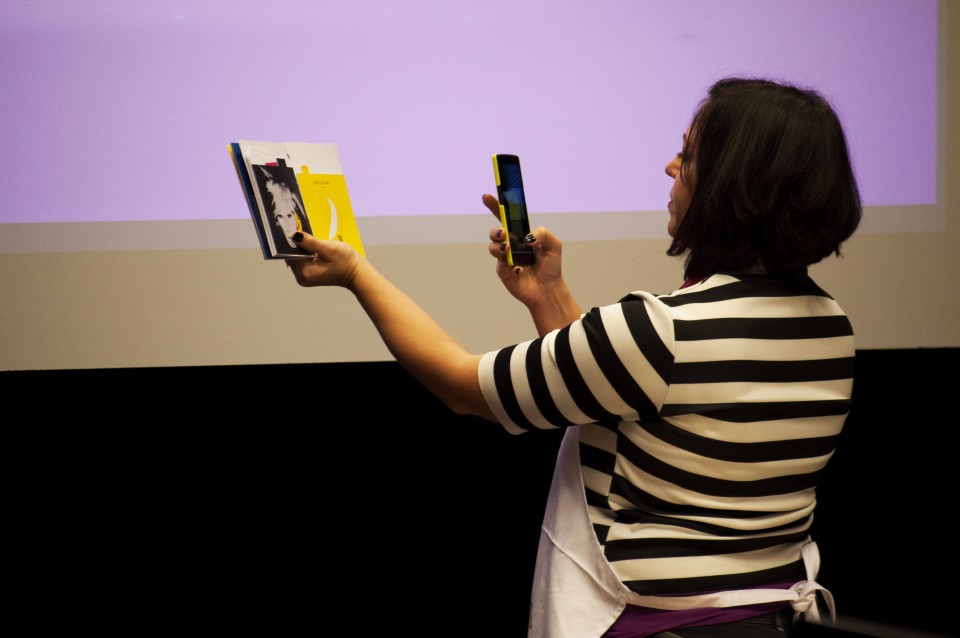
Cook Lee is an interactive cook set, constituted by an interactive apron, with wearable and washable technology, an art cook book - with references to cooking and art - and a box - with scale, speaker and slot for mobile integrated - in which an app runs. Cook Lee aims in enriching the cooking experience, transmitting knowledge from the contemporary art, the artists and their work through their relation with recipes. We are ready for London, but we at the same time are improving the project and editing possible bugs. We are really happy because we believe in Cook Lee and its potentials and this is only the beginning, we want to move on and reach its implementation. In the question “How big can it get” that we are asking ourselves, we reply that in the future we would like to implement “THE Cook Lee”. The must cooking gadget which will introduce to us artists through the pleasant procedure of cooking! People! Fasten your apron!”.
First published in Popaganda.gr on 31.01.2016: http://popaganda.gr/hackathon-stegi/
Original Greek text: Philippa Dimitriadi / Translated into English by Eliza Papaki
Photographs by Katerina Samartzi / FOSPHOTOS
